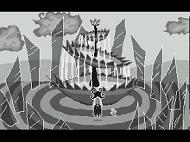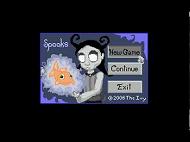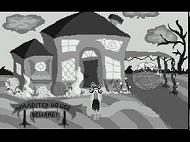|

Spooks
|
|
Review by Thaumaturge
|
 To win a bright orange goldfish at a funfair game of darts is not usually something to be remarked upon. However, this is quite an achievement within the ubiquitously grey Land of the Dead, where the word “alive” is almost entirely unknown – and frowned upon by the authorities. Nothing, however, seems to perturb Mortia, the little ghoul with a sarcastic sense of humour who wins this extraordinary being.
To win a bright orange goldfish at a funfair game of darts is not usually something to be remarked upon. However, this is quite an achievement within the ubiquitously grey Land of the Dead, where the word “alive” is almost entirely unknown – and frowned upon by the authorities. Nothing, however, seems to perturb Mortia, the little ghoul with a sarcastic sense of humour who wins this extraordinary being.
“Drift right up! Drift right up!” calls the skeleton at the darts booth to Mortia. It doesn't take long for him to convince her to try her hand, and in moments she has won a prize – something special. The skeleton explains that this being is “alive”, and that this specific type of being is called a “goldfish”. As to what “alive” means, he seems to know nothing more than that living creatures require food and water to stay alive – just as the beings of the Land of the Dead require ashes and tears. If skeleton has any more information to offer, he doesn't stay long enough to say it. Before Mortia can ask much more, he hurriedly closes his booth, leaving nothing but a “gone haunting” sign to answer Mortia's questions.
It is up to Mortia to explore the “Carnage-Val” for information on this strange new word: “alive”. She also has to find a safe place for the goldfish Mortia decides to call “Spooks”.
 Thus begins the story of Spooks. The game follows little Mortia's explorations of the Carnage-Val and beyond. For most of the game, Mortia’s goal is to discover the meaning of the word “alive”. During this quest, she meets a variety of strange characters. A few of these will hinder her, but a number will provide help – in exchange for some aid from her, of course.
Thus begins the story of Spooks. The game follows little Mortia's explorations of the Carnage-Val and beyond. For most of the game, Mortia’s goal is to discover the meaning of the word “alive”. During this quest, she meets a variety of strange characters. A few of these will hinder her, but a number will provide help – in exchange for some aid from her, of course.
For the majority of the game, the story advances very little. Instead the game focuses on Mortia's attempts to discover enough about the word “alive” to keep the goldfish Spooks in possession of this strange trait. Eventually, Mortia will discover a means of taking Spooks to somewhere more congenial to his living nature. Through this discovery, Mortia will find out some seemingly important things about herself as well. Despite the lack of immediate advancement, the story is fun and interesting.
The story is advanced primarily through the dialogue, in reward for Mortia's efforts for and against the various beings of the Carnage-Val. Mortia’s tasks are of course primarily requested, or at least suggested, by previous conversations. Given the importance of dialogue in Spooks, it is fortunate that the writing is one of the exemplary points of the game – provided that you enjoy puns. The majority of the humor of the game is found in the dialogue, and the majority of that humor is in the form of puns. If you are amused by this form of word play (as I will admit that I am), then the game can be very funny indeed. This adds greatly to the quest relation in many cases, which naturally enhances the game play experience.
 The characters in Spooks are quirkily interesting, often being seemingly ironic choices for their job. For instance, the friendly greeter at the gate to the Carnage-Val is a demon, and the fortune teller is a being consisting primarily of a giant eye – which is highly myopic. While no single character is given the chance to gain much depth (with the possible and minor exception of Mortia herself), this seems to be well-suited for the light spirit of the game. Mortia specifically is an interesting and engaging character. It is truly fun to control her throughout the adventure. Given the manner of the game's ending, she is also a character I would very much like to see in another game.
The characters in Spooks are quirkily interesting, often being seemingly ironic choices for their job. For instance, the friendly greeter at the gate to the Carnage-Val is a demon, and the fortune teller is a being consisting primarily of a giant eye – which is highly myopic. While no single character is given the chance to gain much depth (with the possible and minor exception of Mortia herself), this seems to be well-suited for the light spirit of the game. Mortia specifically is an interesting and engaging character. It is truly fun to control her throughout the adventure. Given the manner of the game's ending, she is also a character I would very much like to see in another game.
The various areas featured in Spooks are similarly amusing, being primarily distorted inversions of common fairground attractions such as merry-go-rounds, haunted houses, and performing animals. They are in general interesting and fun, and fit excellently with the setting of the game.
Mortia's descriptions of her environment, and the objects and beings in it, account for a great part of the character’s appeal and personality. Mortia’s comments are made from distorted view of a ghoul: When presented with a bed, she remarks that she has the urge to hide beneath it and make scratching noises. Once the player has access to a lit candle, attempts to use it in most places will result in Mortia commenting that she prefers engineered destruction to wanton. Furthermore, Mortia also displays a wonderfully sarcastic sense of humor that, to my mind at least, serves to make her a far more fun character to control. The ghoul’s witty remarks are a great reward for the inspection of the environment.
 On that note, it is also worth mentioning that the environment is filled with areas that can be examined. Even the clouds often have brief descriptions – an attention to detail that enriches the game world.
On that note, it is also worth mentioning that the environment is filled with areas that can be examined. Even the clouds often have brief descriptions – an attention to detail that enriches the game world.
The puzzles placed before the player are often a lot of fun, and while occasionally requiring pause for thought, are generally not overly difficult. Unfortunately a few of them do feel a little arbitrary, especially the “scary-go-round” puzzle, which can easily end up being completed with absolutely no knowledge of why you're doing this and what reward is to be gained from it. In addition to this, some items seem to be rather too conveniently found – although this could perhaps be explained, at least in part, by the major plot twist found towards the end.
There are a few cases in which the solution to a puzzle may be not be obvious, primarily because one or two items are not as easy to spot as I would have liked. However, these are by far the exception, and even they should not be too hard to solve with a little careful observation.
 The puzzles are primarily inventory-based, largely involving helping the various beings of the Carnage-Val in one way or another. In addition to this, there is one riddle-based puzzle, and one brief pure dialogue puzzle.
The puzzles are primarily inventory-based, largely involving helping the various beings of the Carnage-Val in one way or another. In addition to this, there is one riddle-based puzzle, and one brief pure dialogue puzzle.
In one or two places it is possible to lose the game. However, given the nature of the main character, it is not possible to actually die. In these cases the player is given the options of quitting, restarting the game, or loading a saved game.
The interface uses one of the classic patterns of adventure game interaction. The player is provided with a small selection of mouse cursors with which to interact with the world: walk to, look at, use/pick up and talk with, represented by a pair of crossed bones, a pair of white eyes, a hand, and a speech bubble respectively. In addition, when an inventory item is selected, that item's image becomes the current cursor, allowing the item to be used on another object. The player can cycle through the cursors by clicking the right mouse button, while the left mouse button allows the player to attempt to enact the action specified by the cursor.
In addition, moving the mouse cursor to the top of the screen causes an icon bar to pop up. This offers buttons to select any of the standard cursor modes, to open the inventory, load and save games, exit the game, and view two brief messages.
 The graphics in Spooks are appropriate and effective – the Land of the Dead is rendered entirely in greyscale. The storyline makes great use of this grey coloring. Objects that are not shades of grey are considered to be strange and highly noteworthy, but are very much frowned upon by the authorities. This choice of visual style feels very appropriate to the setting without ever detracting from the appeal of the graphics. The artistry of the visuals is not, however, outstanding. While certainly up to the task, they are at times a little rough, and sometimes not entirely convincing in my opinion. Nevertheless, the style of the graphics is very well chosen, and adds well to the quirky, funny atmosphere of the game.
The graphics in Spooks are appropriate and effective – the Land of the Dead is rendered entirely in greyscale. The storyline makes great use of this grey coloring. Objects that are not shades of grey are considered to be strange and highly noteworthy, but are very much frowned upon by the authorities. This choice of visual style feels very appropriate to the setting without ever detracting from the appeal of the graphics. The artistry of the visuals is not, however, outstanding. While certainly up to the task, they are at times a little rough, and sometimes not entirely convincing in my opinion. Nevertheless, the style of the graphics is very well chosen, and adds well to the quirky, funny atmosphere of the game.
Unfortunately, some of the the animations are a little jerky to my eye – a minor problem which could have been rectified by the addition of a few more intervening frames to the animations. Balancing this is the fact that other animations are quite nice, and it's impressive to see the effect that a simple animation can have in portraying a character's mood or actions.
This game's music deserves mention. It is both cute and spooky, perfectly fitting the theme and mood of the game, and helps to set that mood very well. In addition, the soundtrack is a lot of fun to listen to, and adds a great deal to the game play experience as a whole.
One final point of note is that this game is rather short. It is possible to complete it within the span of a few hours. However, the game does not feel rushed at all – rather the story that it tells is brief, and so the game itself is naturally brief as well. While a short length is not at all unusual for freeware games, it is nevertheless worth noting.
Especially given its brevity, if Spooks was a commercial release, it may not have been a game that I would buy. But it is a game that can definitely be recommended for download. The file size is fairly small (just under five megabytes), so even those of us still restricted to a modem should be able to download the game without too much trouble. This game is a great deal of fun, and very funny (again, providing that you have no objection to puns), and tells an interesting and imaginative story.
Final score: 80/100.
To download Spooks, visit the xii games Web site.
  
|
| PC System Requirements: |
| Windows® 95 OSR2/98/ME/2000/XP |
| Pentium® 233 Mhz (500Mhz if the option to run at a resolution of 640x480 is chosen) |
| 32 MB RAM |
| DirectX® 5 or above |
| DirectX® 5 or above Compatible Sound and video cards |
| Keyboard, mouse, speakers |
|
|
|

